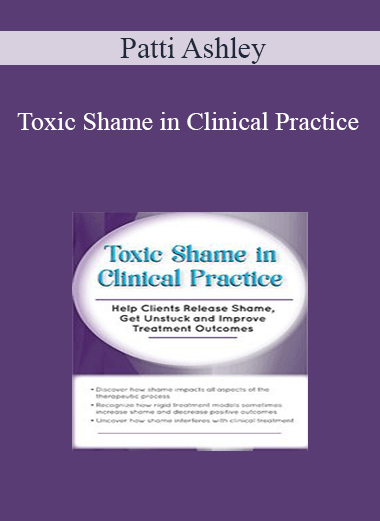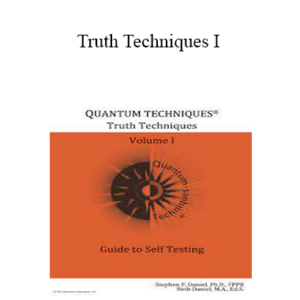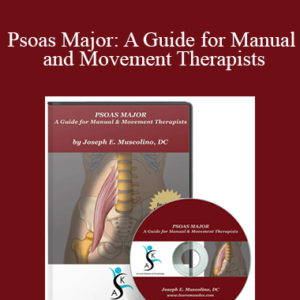- Faculty:
- Patti Ashley
- Duration:
- 5 Hours 49 Minutes
- Format:
- Audio and Video
- Copyright:
- Sep 14, 2018
Description
Outline
PART ONE: HOW SHAME SHOWS UP IN TREATMENT
Toxic Shame
Research & Definitions
- Ruptures in interpersonal relationships create a shame-based identity
- Shame and trauma function similarly in the nervous system
- Subconscious shame effects of poisonous parenting
- Attachment theories as they relate to shame
- D.W. Winnicott’s true self/false self
- Shame in family, culture and other systems
- Limitations of the research
Signs of Toxic Shame:
What to Watch for in Assessment and Beyond
- Individual Therapy – the client who:
- Talks the whole session
- Frequently cancels sessions
- Feels bad when progress seems to have eluded
- Terminates treatment early
- Deflects and projects onto others
- Relapses and does not return
- Minimizes problems
- Excessively intellectualizes and analyzes treatment
- Couples/Family Therapy
- The attack/defend patter
- Anger, rage and contempt
- Judgment of self and others
- Grandiosity, narcissism and self-inflation
- People pleasing and codependency
- Avoidance
- Problems with intimacy
- Group Therapy:
- Cross-talk
- Intellectualizing
- Silence
- Judgment
- Conflict
When the Therapist is Part of the Problem
Rigid Treatment Models May Increase Shame and Decrease Positive Outcomes
- Shame can be activated when therapist appears to be the “expert”
- Some strategies hinder treatment outcomes
- Strategies that may create barriers to creativity and relational presence
- Impact of mirror neurons and epigenetics
- How naming “shame” can be shaming
- Unconsciously enacting shaming parent
- Treating client as appointment or diagnosis
- What to do when your shame is triggered in-session
PART TWO: TREATING THE TOXIC SHAME
Effectively Treat Toxic Shame
Implications for Treatment to Move Forward with Clients
- Right and left brain integration
- Bottom-up versus top-down treatment approaches
- Modeling, engaging and sustaining self-compassion
- Repair the interpersonal bridge to self and others
- Courage and vulnerability in right-brain regulation
- Sustaining empathy in parallel process
- Transference and counter-transference in treatment
Therapeutic Strategies:
Putting It All to Practice
- Build a Safe Therapeutic Holding Environment
- Establish safety and trust
- Set a stage for treatment
- Strong foundation for therapeutic work
- Build a Solid Relationship
- Therapeutic empathy as the antidote for shame
- Connect and establish equal power
- Mindfulness and compassion
- Bridge the Head and Heart
- Psycho-education to demystify shame
- ”I” statements to identify shame-based feelings
- Going beyond cognitive therapy models
- Witness and guide clients through deeper layers
- Return shame to its origin
- Somatic strategies
- Re-wiring new neural pathways
- Experiential Tools and Techniques
- Creative arts, writing and movement activities
- Mindfulness and meditation
- Archetypes, story-telling and mythology
- Music and sound healing
- Journaling and letter-writing
- Working with Secrets
- Patience and compassion
- Deeper shame
- Tolerance and non-judgmental witnessing
- Creativity
- Every client is unique
- How therapy is like art
- Goodness of fit
- Research limitations and potential treatment risks
Faculty
Patti Ashley, Ph.D., L.P.C. Related seminars and products: 3
Patti Ashley, Ph.D., L.P.C. owns and operates Breakthrough Psychotherapy and Parent Coaching in Boulder, Colorado. Combining elements of developmental, cognitive, strength-based, and positive psychology, Dr. Ashley has created a psychotherapy model that helps clients excavate authenticity and life purpose. Identifying dysfunctional patterns and treating shame-based disorders are integral parts of her work with individuals, groups, couples and families.
Patti has over thirty-five years of experience in the fields of education and psychology. These include developing continuing education courses for physicians and hospital wellness programs; instructing undergraduate and graduate courses for universities; and counseling individuals, couples and families in mental health agencies, psychiatric hospitals, and private practice settings.
Dr. Ashley completed a Doctor of Philosophy Degree in 2002. she is the author of the book Living in the Shadow of the Too-Good Mother Archetype, (2014) Dr. Ashley is currently writing two other books scheduled for release in 2018: Reconciliation of the Heart: How Beliefs, Choices and Forgiveness Influence Authenticity and Life Purpose,and Letters to Freedom: A True Story of Grief and Love that Never Dies. Patti is also a featured journalist for numerous publications, and a frequent workshop presenter.
Speaker Disclosures:
Financial: Patti Ashley maintains a private practice. She receives a speaking honorarium from PESI, Inc.
Non-financial: Patti Ashley has no relevant non-financial relationship to disclose.
Delivery Method
– After your purchase, you’ll see a View your orders link which goes to the Downloads page. Here, you can download all the files associated with your order.
– Downloads are available once your payment is confirmed, we’ll also send you a download notification email separate from any transaction notification emails you receive from coursesblock.com.
– Since it is a digital copy, our suggestion is to download and save it to your hard drive. In case the link is broken for any reason, please contact us and we will resend the new download link.
– If you cannot find the download link, please don’t worry about that. We will update and notify you as soon as possible at 8:00 AM – 8:00 PM (UTC 8).
Thank You For Shopping With Us!







